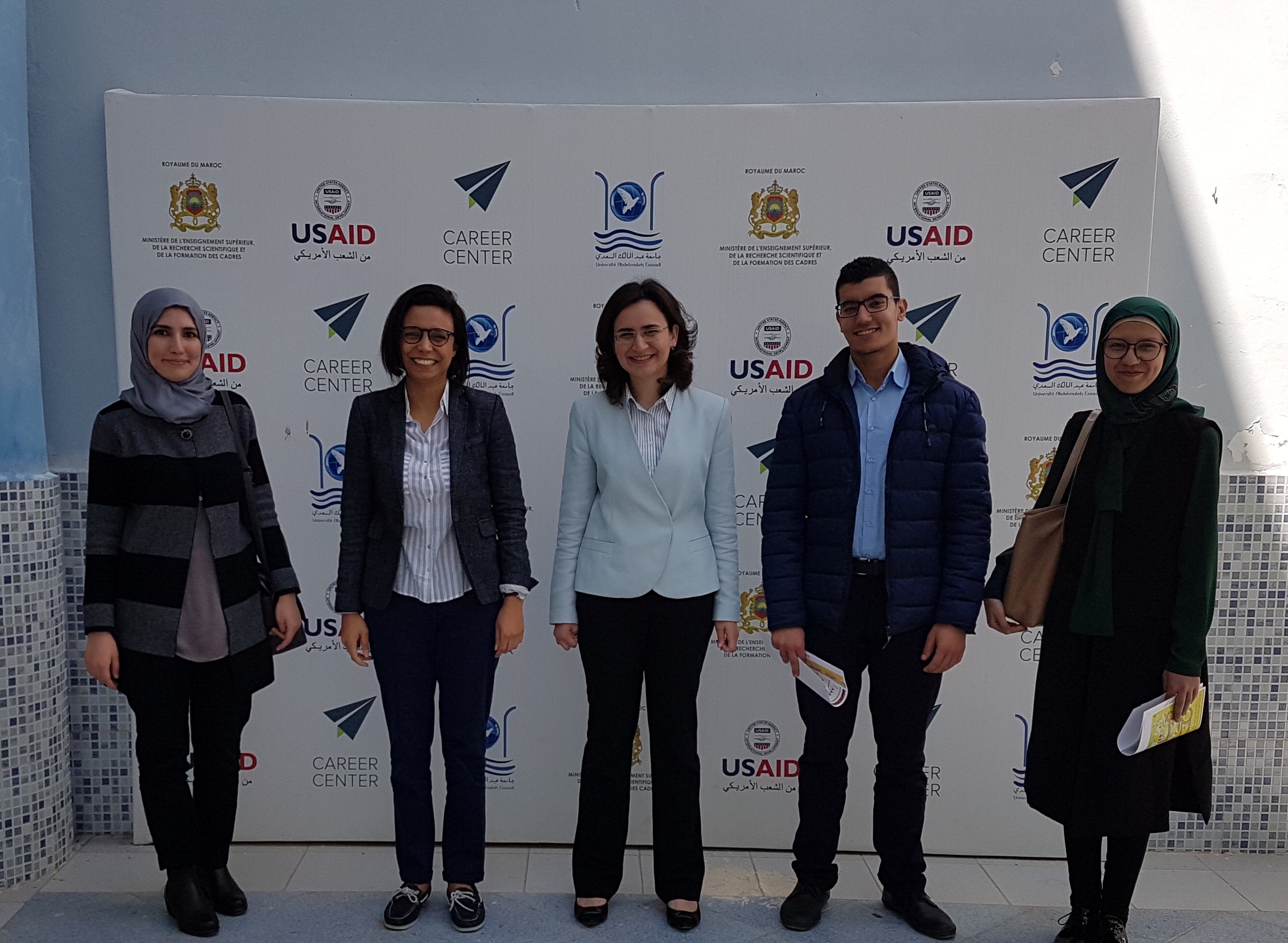|
Cycle 5 (2015 Deadline)
Data Science for Improved Education and Employability in Morocco
PI: Ghita Mezzour (ghita.mezzour@uir.ac.ma), International University of Rabat
U.S. Partner: Kathleen Carley, Carnegie Mellon University
Project Dates: February 2017 - January 2020
Project Overview
 | | The PI and her team at the USAID career center in Tangier. Photo courtesy of Dr. Mezzour |
The mismatch between the job supply and demand creates major social, political, and economic problems in Morocco. Every year, many graduates are unable to find jobs, and the resulting youth unemployment causes major social and political tensions. Paradoxically, at the same time, employers are unable to find candidates with the required skills, and this skills shortage results in missed economic opportunities for the country. Despite the importance of studying the skill mismatch in Morocco, the topic attracts very limited attention in the literature. Moreover, there is a lack of large data sets that researchers can use to systematically study the issue and identify effective interventions to alleviate it.
The goal of this project was to measure the skill mismatch in Morocco and identify measures to align university training with the job market. More specifically, these researchers collected and analyzed multiple large data sets about higher education and the job market in Morocco. They built profiles of university graduates and job openings in Morocco and identified areas of misalignment between the two. They also interviewed human resources staff from multiple organizations to learn about their concerns in more detail. Finally, they collected traditional and social media discussions about higher education and jobs in Morocco in order to learn about the general population’s concerns about the topic.
Final Summary of Project Activities
To reduce the problem of skill mismatch, it is important that higher education institutions have information about job market needs and adapt their curricula accordingly. Youth also need to be aware of job market needs in order to choose education paths that maximize their chances of finding a job. To examine whether higher education institutions and youth receive information about job market needs, the PI and her team analyzed the extent of collaboration between employment stakeholders using surveys and Social Network Analysis. A total of 79 representatives of the private sector, public sector, youth, universities, recruitment agencies, and funders took the survey in three major Moroccan cities. The team’s analysis reveals that higher education institutions receive very little information about job market needs from the private sector. Similarly, youth receive limited information about job market needs from the private sector and higher education institutions.
The researchers collected and analyzed official reports and tweets by employment stakeholders (private sector, public sector, universities, vocational schools, and youth) to identify the mental model and priorities of these stakeholders. They found that universities are concerned about education and research but pay little attention to employment. On the other hand, companies are concerned about their products and services but think little of education. The different mental models of stakeholders probably impede collaboration between them.
To help higher education institutions and youth have access to job market information, the team collected novel data sets about the Moroccan job market and developed new techniques to analyze such data. More specifically, on a weekly basis they collected job ads posted in 10+ top recruitment Moroccan websites. Analyzing job ads would reveal job market needs and trends in Morocco, but such analysis is challenging because the majority of these ads are non-structured or semi-structured. Moreover, duplicate ads need to be removed, but those duplicates are difficult to automatically identify because they appear under different formats in different websites. In this project, the researchers used a variety of Natural Language Processing (NLP) techniques to remove duplicate ads and to extract and standardize job attributes from job ads. For example, they developed a novel NLP technique to extract and standardize soft skills that achieved a 0.84 F-score compared to the 0.54 F-score achieved in prior work (F-score is an accuracy measure that is between 0 and 1). Other than soft skills, they extracted and standardized the job title, location, languages, recruiting company, education level, experience level, and hard skills. They focused on analyzing the needs of three promising sectors for the Moroccan economy: automobile, offshore and cybersecurity.
Overall, this project has increased awareness about (1) the importance of building ties between the private sector and higher education institutions, (2) the importance of analyzing job market needs and taking such needs into account when designing curricula, and (3) interest in using a data science approach to analyzing job market needs that can provide real-time analysis in a cost efficient manner. The PI and her team have increased such awareness by organizing stakeholder meetings at the International University of Rabat, giving talks at various venues, and meeting individually with various decision makers.
Publications
Ibtissam Makdouna, Ibrahim Rahhala, Ghita Mezzour, Ismail Kassoua, and Kathleen M Carley. 2021. Skill mismatch evidence for Cybersecurity skills in Morocco. Procedia Computer Science 184: 941–946. https://doi.org/10.1016/j.procs.2021.03.117
Imane Khaouja, Ghita Mezzour, Kathleen M. Carley, and Ismail Kassou. 2020. Can we use newspapers to predict job creation? ICIET 2020: Proceedings of the 2020 8th International Conference on Information and Education Technology, March 2020, pp. 206–211. https://doi.org/10.1145/3395245.3396421
Imane Khaouja, Ghita Mezzour, Kathleen M. Carley, and Ismail Kassou. 2019. Building a soft skill taxonomy from job openings. Social Network Analysis and Mining 9: 43. https://doi.org/10.1007/s13278-019-0583-9
Ibrahim Rahhal, Ibtissam Makdoun, Ghita Mezzour, Imane Khaouja, Kathleen Carley, and Ismail Kassou. 2019. Analyzing Cybersecurity Job Market Needs in Morocco by Mining Job Ads. IEEE Global Engineering Education Conference (EDUCON), Dubai, United Arab Emirates, 2019, pp. 535-543. https://doi.org/10.1109/EDUCON.2019.8725033
Back to PEER Cycle 5 Grant Recipients
|
|
|
|




